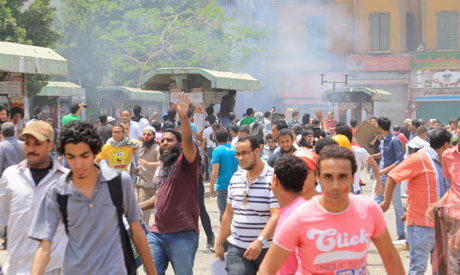
Clashes near Defence Ministry in Abbasiya, Cairo, Wednesday, 2 May 2012 (Photo: Mai Shaheen)
The Supreme Council of the Armed Forces (SCAF) held a press conference Thursday afternoon to discuss Wednesday's clashes at a sit-in in front of the Ministry of Defence as well as the upcoming presidential elections and the ongoing constituent assembly saga.
"The death toll of victims in the Abassiya Square clashes has increased to nine in addition to the 168 injured," stated SCAF member Major General Mohamed El-Assar at the start of the meeting that was attended by Egyptian and foreign reporters.
El-Assar added that, since assuming power, the military has deliberately left the security of protests in the hands of the demonstrators in order to avoid any further clashes with the public.
He also claimed the army has not used violence against the people or peaceful protesters since January 2011.
While sitting in front a large banner reading "The armed forces keep their promises", El-Assar questioned the protesters' decision to demand the immediate handover of military power just 20 days before from the presidential elections.
The Major General repeated that the council will hand over authority of the country to a civilian president before 30 June 2012.
"The SCAF will not rig the elections nor does it have a secret presidential candidate [it plans to run] in Egypt's first multi-presidential elections held in thousands of years,” El-Assar said answering fears and allegations made by different political forces and the media about the possibility of rigged votes.
He also added that, contrary to last week's rumours stating that the Supreme Presidential Electoral Commission (SPEC) rejected requests made by foreign NGOs to monitor voting, observers from 45 foreign countries have been invited to follow the elections. The list includes NGOs such as the US Human Rights organisation, the Carter Center.
In response to calls by different political forces for a solidarity march to the defence ministry following a week-long Abassiya sit-in, El-Assar said that the SCAF welcomes any peaceful "million man" protest. However, he added, the ruling military council rejects any march that will converge on the military's headquarters.
"We prefer to have sits-in and protests in Tahrir Square instead of Abbasiya and the Ministry of Defence area," El-Assar commented.
At the close of the press conference SCAF member Major General Mokhtar El-Mulla reiterated the point, warning against any attempts by protesters to protest near a military facility.
SCAF members also discussed the constituent assembly and the position of army in the upcoming writing of the constitution, denying that the military seeks any hand in the process.
"The articles related to the Armed Forces in all Egyptian constitutions since 1923 do not give the army any special position," Major General Mamdouh Shahin claimed.
Shahin also revealed that the military were keen to discuss the status of the constitution and all Constitutional Declaration articles issued since the ouster of Mubarak with Egypt's political powers and law experts.
He added that the SCAF was looking forward to having a constitution in place before forthcoming presidential elections.
Despite the military-authored March 2011 Constitution Declaration stating that the constitution be drafted after electing the president, the military council now insists the constitution be completed before in order to specify the elected ruler's powers.
The Islamist-dominated constituent assembly, tasked with drafting the constitution, has already faced many problems.
Within days of the official membership list being announced, there was a mass walkout of members from the liberal and leftist parties, independent prominent figures and representatives of the unions and syndicates as well as Egypt's main Islamic authority, Al-Azhar, and the Coptic Church.
All objected to the Islamist majority in the assembly and the method used to chose its members, which saw 50 constituents elected from within parliament and 50 from without. Many added that it did not reflect the diversity of Egyptian society.
Following a successful law suit, the body was then suspended by the Administrative Court for violating articles in the Constitutional Declaration.
Currently the SCAF, political parties and the members of the assembly are in negotiations to reach an agreement regarding guidelines that would specify how the constitution-building body is formed. So far no consensus has been reached.
Short link: